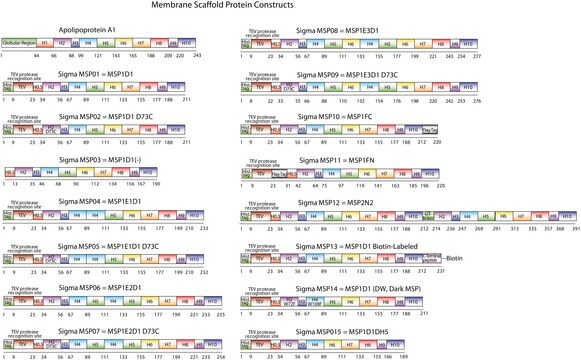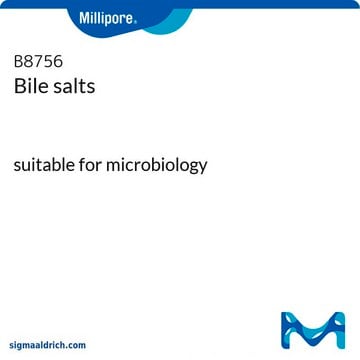C6445
Sodium cholate hydrate
BioXtra, ≥99%
Synonym(s):
3α,7α,12α-Trihydroxy-5β-cholan-24-oic acid sodium salt, Cholalic acid sodium salt
About This Item
Recommended Products
description
anionic
Quality Level
product line
BioXtra
Assay
≥99%
form
powder
mol wt
micellar avg mol wt 900-1300
aggregation number
2-3
impurities
≤0.05% Phosphorus (P)
≤0.1% Insoluble matter
CMC
9-15 mM (20-25°C)
solubility
H2O: 1 M, clear, faintly yellow to yellow
anion traces
sulfate (SO42-): ≤0.05%
cation traces
Al: ≤0.005%
Ca: ≤0.005%
Cu: ≤0.0005%
Fe: ≤0.0005%
K: ≤0.005%
Mg: ≤0.0005%
NH4+: ≤0.05%
Pb: ≤0.001%
Zn: ≤0.0005%
HLB
18
SMILES string
O.[Na+].C[C@H](CCC([O-])=O)C1CCC2C3[C@H](O)CC4C[C@H](O)CC[C@]4(C)C3C[C@H](O)[C@]12C
InChI
1S/C24H40O5.Na.H2O/c1-13(4-7-21(28)29)16-5-6-17-22-18(12-20(27)24(16,17)3)23(2)9-8-15(25)10-14(23)11-19(22)26;;/h13-20,22,25-27H,4-12H2,1-3H3,(H,28,29);;1H2/q;+1;/p-1/t13-,14+,15-,16-,17+,18+,19-,20+,22+,23+,24-;;/m1../s1
InChI key
MUVVIYFKOVLQHL-RCVKHMDESA-M
Looking for similar products? Visit Product Comparison Guide
General description
Application
- as a component of biofilm growth media along with tryptic soy broth (TSB) to test the effects of each bile salt on biofilm formation
- as a detergent to study its effect on cannabinoid receptor 1 (CB1) detection by western blot
- as a promoter to prepare solution B for the synthesis of tungsten disulfide (WS2) on a SiO2/Si wafer
Features and Benefits
- pH range 5-8
- Suitable for membrane technology and culture media
Hazard Statements
Precautionary Statements
Hazard Classifications
Aquatic Chronic 3
Storage Class Code
11 - Combustible Solids
WGK
WGK 3
Flash Point(F)
Not applicable
Flash Point(C)
Not applicable
Personal Protective Equipment
Choose from one of the most recent versions:
Certificates of Analysis (COA)
Don't see the Right Version?
If you require a particular version, you can look up a specific certificate by the Lot or Batch number.
Already Own This Product?
Find documentation for the products that you have recently purchased in the Document Library.
Customers Also Viewed
Protocols
Surfactant-assisted dispersion of single-walled carbon nanotubes for debundling or exfoliation in dispersion procedures.
Our team of scientists has experience in all areas of research including Life Science, Material Science, Chemical Synthesis, Chromatography, Analytical and many others.
Contact Technical Service









